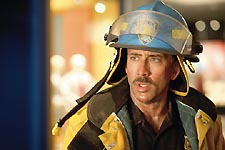Hero Worship
Oliver Stone's magnificent 'WTC' is a reminder that even the most horrifying events bring out the good in our society
World Trade Center is likely the one summer release you least want to see. It is, after all, a brutal reminder of the horrifying events of September 11, 2001 — a cataclysmic tragedy that scorched our souls, burned our hearts, and permanently stoked our deepest fears. Why rekindle the awful memory of that day when you can escape into mindless summer fare? But the fact is, World Trade Center is the one film you don’t want to miss. By no means is it easy to sit through, and even though it trades on the notion of hope and heroes, it still manages to depress the hell out of you, recalling a day that left our country — and much of the world — shellshocked beyond comprehension.
There are some critics who say it’s too soon for cinematic dramatizations of the 9/11 events; the collective emotional wounds are too fresh. Even I have still not mustered the courage to sit through United 93, Paul Greengrass’s dramatic supposition of how events played out on the one plane that, due to the courageous efforts of its passengers, didn’t strike its intended target. Despite the fact that I make my living watching movies, I just can’t emotionally confront that movie.
 Bravery personified: Cage |
I wasn’t sure I was ready for World Trade Center either, but one can’t run from fears forever. Within the first five minutes — a serene, expertly paced montage depicting a city, Manhattan, starting its daily routine — director Oliver Stone had my attention. By the midway point, he had my admiration, for this is the first time in years that Stone, a sporadically great filmmaker, has made a movie this genuinely absorbing and compelling. With the exception of an appearance by Jesus — an hallucination observed by one of two Port Authority police officers trapped beneath the rubble of the Twin Towers — Stone forgoes his usual cinematic tricks and instead applies a sturdy bricks-and-mortar style of direction, one that places a huge emphasis on drama. He lets the situation, as well as our familiarity with it, carry the film.
The worst thing any filmmaker could have done was to turn the destruction of the towers into a disaster epic (although I’m sure one day some aspiring Irwin Allen will try). The magnitude is there, but it’s the small, human events within that day that hold the most potency. Stone, working from a screenplay by Andrea Berloff, knows this, and he concentrates on the story of those two trapped Port Authority officers, John McLoughlin (Nicholas Cage) and Will Jimeno (Michael Pena). Even though we know the outcome — they were two of only 20 survivors rescued from Ground Zero — their story, in Stone’s hands, is as gripping and suspenseful as they come, fraught with angst and anxiety, fear and uncertainty. Stone adds weight by cross cutting from the trapped men to the reactions of their wives, who have no idea whether or not their husbands have survived.
Maria Bello is brilliant as Donna McLoughlin, portraying her with a steady, unbreakable resolve, while Maggie Gyllenhaal imbues pregnant Allison Jimeno with an increasingly edgy panic. Through their reactions, Stone is able to draw out of World Trade Center a stirring, intimate, deeply identifiable reality.
World Trade Center has many astonishing, memorable moments, but is at its strongest during its first act, as the attack occurs. Stone captures the confusion and the inexplicableness of the morning’s events with a master filmmaker’s touch. Once John and Will are trapped, the men have little to do but try and stay awake in hope of rescue, yet you can see it in their eyes: They don’t expect to leave this underground hell alive. Cage is especially compelling — his performance hitting extremes of quiet resignation and primal terror. Pena is less unbridled than Cage, but his fear is no less palpable. The supporting cast includes Stephen Dorff, Frank Whaley, Danny Nucci and Jay Hernandez, who, as a fellow trapped officer, provides the movie’s most heartbreaking moment. Frankly, there is not a single performance in the whole of World Trade Center that rings false. It is a perfectly acted film.
You would expect Stone to create a film that delves into the conspiracy theories of that day — God knows, there are enough of them swirling out there, take your pick — but he puts his ideologies aside, and, for once, simply delivers the goods. Remarkably, he seems to have no political agenda, and he allows himself to be constrained by the facts. Stone’s more interested in celebrating the efforts of the heroes — the hundreds upon hundreds of first responders who lost their lives trying to evacuate the airplane-damaged buildings prior to the collapse — and the heroes who later ventured into the impossibly thick billow of dust and smoke, onto a landscape of twisted steel and broken stone, to find anyone — anyone — who might have survived.
Once McLoughlin and Jimeno are found, there’s the problem of getting them out at great personal risk. But these men — Marines, firefighters, paramedics, police officers — are fearless, fueled by an internal, instant camaraderie, and a instinctive need to do what they do best: good.
”Sept. 11 showed us what human beings are capable of,” says Cage in a voice-over at the movie’s end. ”The evil, sure. But it also showed us the goodness.” It is that goodness Stone — a filmmaker who has been turning over rocks for much of his career examining the unsavory, squiggly things beneath — wants to commemorate most. And it’s a goodness largely forgotten as we’ve gotten past that day.
World Trade Center serves as a reminder that we should never forget the goodness. Because good is what defines the heart, the soul, the essence of America. Let’s pray it won’t take another 9/11 to let that goodness shine bright again.
Support Metro Weekly’s Journalism
These are challenging times for news organizations. And yet it’s crucial we stay active and provide vital resources and information to both our local readers and the world. So won’t you please take a moment and consider supporting Metro Weekly with a membership? For as little as $5 a month, you can help ensure Metro Weekly magazine and MetroWeekly.com remain free, viable resources as we provide the best, most diverse, culturally-resonant LGBTQ coverage in both the D.C. region and around the world. Memberships come with exclusive perks and discounts, your own personal digital delivery of each week’s magazine (and an archive), access to our Member's Lounge when it launches this fall, and exclusive members-only items like Metro Weekly Membership Mugs and Tote Bags! Check out all our membership levels here and please join us today!























